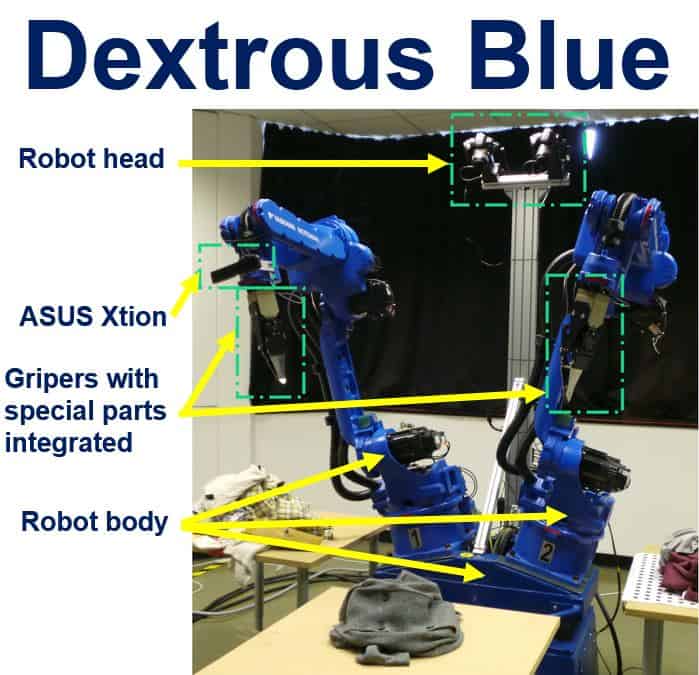Dextrous Blue is an 8-foot tall robot designed to do one of the most mundane household chores – sorting and folding clothes. Its creators, from the University of Glasgow, believe it could well be a technological breakthrough to rival the automatic washing machine, which transformed domestic routines.
Not only does Dextrous Blue sort clothes, it also folds them and puts them neatly into a pile.
It even works out how best to arrange a pile of clothes, and can fold all garments, large or small.
The scientists, from Scotland, Italy, Greece and the Czech Republic, had to focus carefully on the technology involved in giving the robot human-like dexterity. Robots can deal with liquids and solids relatively well, flowing fabrics are much more challenging.

Dextrous Blue has been created by a team of Scottish, Greek, Czech and Italian scientists. (Image: CloPeMa)
Research associate, Dr Gerardo Aragon Camarasa, who works at the University of Glasgow’s School of Computing, said:
“The most difficult aspect was to understand the dynamics and the interaction with these type of materials. Because they are not completely solid. They are very floppy and very difficult to understand what’s going on.”
Dextrous Blue touches, sees and hears
Dextrous Blue is 8 foot high and has a pair of enormous mechanical arms with grippers at the end that do the sorting and folding. Its two electronic eyes were made from digital cameras.
According to the creators:
“The robot head comprises two Nikon DSLR cameras (D5100) that are capable of capturing images at 16 mega pixels. These are mounted on two pan and tilt units (PTU-D46) with their corresponding controllers. The cameras are separated by a pre-defined baseline for optimal stereo capturing. Its position enables imaging the robot work-space from above. The head provides the robot system with high resolution 3D points clouds.”
The robot can even hear – through sensors in its hands – where it discerns the subtle rustles of different fabrics.
Dr. Paul Siebert, who also works at the University’s school of computing, and specialises in vision research, said:
“The key innovations behind this machine are the use of vision and how we understand the scene in terms of providing very, very high accuracy in our depth sensing.”
“So we treat the clothing as a sort of mountain range and then parse that range into its different shapes, which allows the machine to build up a picture of what state the clothing is in.”
“This sounds very trivial, the sort of thing a person could do instantly. But to get a machine to do this is a phenomenally difficult task.”
CloPeMa
The project is called CloPeMa, which stands for Clothes Perception and Manipulation.
The research team hope their technology may eventually be used in the textile industry, as well as driving advances in other areas of robotics.
Dr. Siebert said:
“Perhaps the most immediate and serious application is onshoring – how to be able to produce perhaps small runs of custom clothing affordably without having to send it to the other side of the world.”
“So you reduce carbon footprint, you increase profitability and you bring textile manufacturing back to Scotland.”
Video – Robot sorting clothes
In this demo you can see the robot sorting clothes into three baskets.
